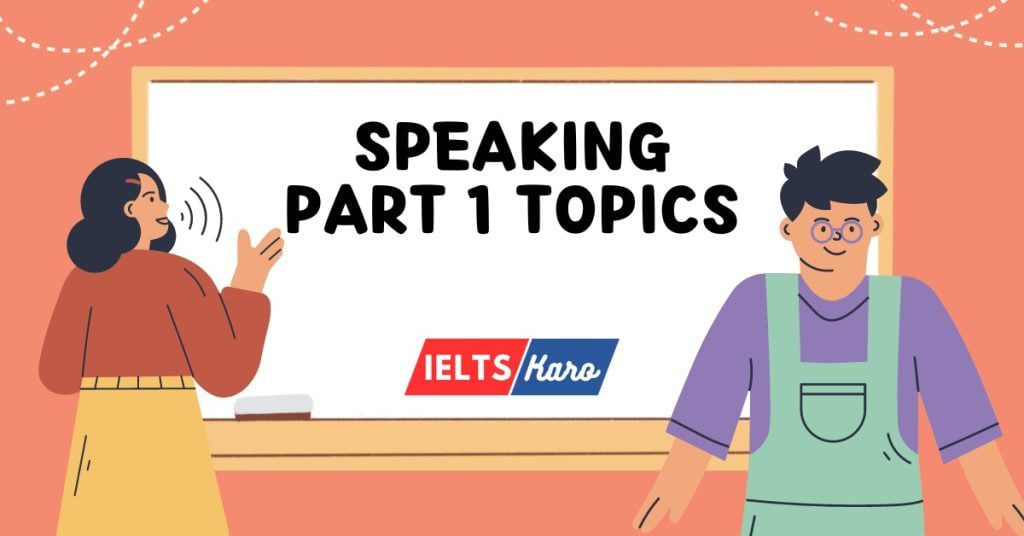IELTS Speaking Part 1
Imagine you are in a professional business environment, perhaps giving an interview, or closing a potential client. They want to know more about YOU as a person and what makes YOU different than others.
Consider the IELTS Speaking Part 1 no different than any other environment, except, it is informal in nature. Sit down, relax, and talk about yourself. The Speaking Part 1 is all about who you are, what you do, what are your likes/dislikes, etc.
Here is a complete guide:
- Part 1 is how your IELTS Speaking exam will kick off.
- The examiner will greet you, ask your name and for your ID card or Passport that you initially used to sign up for the test.
- The examiner will then brief you about the test and the pattern.
- He/she will then proceed with the questions.
- This test could be in person, or over a Zoom/Google Meet video call.
- 10 to 12 questions will be asked in a span of up to 5 minutes.
Common Speaking Part 1 Topics
Here are some of the most common types of questions that the examiner can ask you in Speaking Part 1. Do note that these are quite generic in nature, and there is no need for you to memorize them at all. That’s because IELTS is a logical test, and no amount of route learning or memorization is going to help you in getting a high band score.
Remember, part 1 is all about you, your city, area, food, residence and your country. How you answer questions in part 1 will define the strategy for the next questions. For example, if you are a working professional such as an employee or a business owner, the examiner will ask questions relevant to your profession. Similarly, if you are a student, he/she can ask you questions related to your studies, the subjects you like/dislike, and what do you want to do in the future.
Questions regarding Study:
- What do you study?
- Where do you study?
- What is your favorite or least liked subject, and why?
- Do you like this subject and/or degree?
- What is the scope of your subject?
- What do you like the most about your school, college or university?
- Do you plan to pursue a career in the same field of study?
Questions regarding Work:
- What is your job?
- Where do you work?
- Do you run your own business or employed somewhere?
- Have you always wanted to be in this profession since your college days? Why or Why not?
- What is your average day like in terms of responsibilities?
Some other common question types:
- What do you like to eat?
- Do you cook? If yes, what do you like to cook?
- What type of clothes do you like to wear?
- What kind of clothes do people wear in your city?
- Do you live in an apartment or a house?
- What are your favorite hobbies?
- Do you read newspapers?
- What type of movies do you like to watch?
- Are you into any sort of extracurricular activity?
FAQs related to this topic:
Q1. What is IELTS Speaking Part 1 about?
Speaking Part 1 is an informal introduction to the IELTS speaking test. The examiner asks you questions about yourself, your background, your hobbies, and your life in general. It’s a chance for you to showcase your basic English communication skills and feel comfortable before moving on to more complex topics.
Q2. How long does Speaking Part 1 last?
Speaking Part 1 typically lasts around 4-5 minutes. It’s the shortest section of the speaking test, but it still plays a role in your overall score.
Q3. Do I need to memorize answers to common questions?
No, memorizing answers isn’t necessary. The examiner wants to hear your genuine responses and see how you use English naturally. It’s better to be prepared with some ideas about yourself and be able to speak spontaneously.
Q4. What are some good strategies for Speaking Part 1?
Here are some tips for Speaking Part 1:
- Relax and be confident.
- Speak clearly and at a moderate pace.
- Use complete sentences and avoid one-word answers.
- Show interest in the conversation and ask clarifying questions if needed.
- Try to elaborate on your answers and provide details.
Q5. What kind of questions might the examiner ask?
The article provides a list of common Speaking Part 1 topics, including questions about your studies, work, hobbies, and daily life. Remember, these are just examples, and the examiner may ask you something different.

